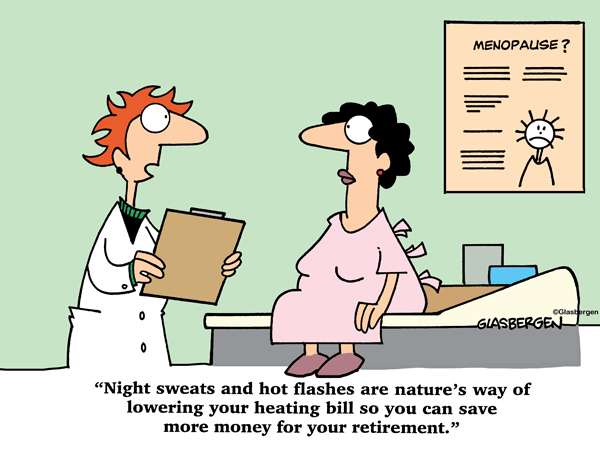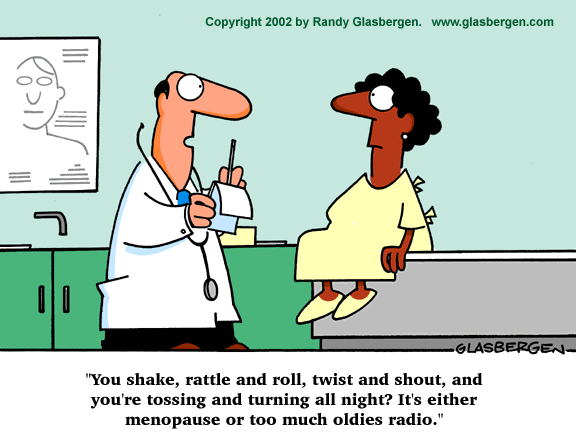Perimenopause is the transitional phase leading up to menopause when a woman's body undergoes various hormonal changes. It typically begins in the 40s but can start earlier for some women. The duration of perimenopause varies, and it concludes when a woman has gone 12 consecutive months without a menstrual period, at which point she enters menopause. Here are some key changes and symptoms that may occur during perimenopause:
Irregular Menstrual Cycles:
- Menstrual cycles may become irregular in terms of length and flow.
- Some women may experience shorter or longer cycles, and others may skip periods.
- Some women may have a period after months of not having one.
Changes in Menstrual Flow:
- The volume of menstrual flow may vary.
- Blood flow may become lighter or heavier than usual.

Hot Flashes and Night Sweats:
- Hot flashes are sudden sensations of heat, usually felt in the face and upper body. If it is the dead of winter and everyone around you is cold and you feel a sudden urge to turn on the air conditioner, odds are it is menopause.
- Night sweats are episodes of intense sweating during sleep, often causing the person to wake up drenched and needing to change the sheets.
Vaginal Changes:
- Reduced estrogen levels can lead to vaginal dryness, itching, and discomfort.
- Changes in the elasticity and thickness of vaginal tissues can occur.
- Sex can become more painful.

Sleep Disturbances:
- Hormonal fluctuations, along with symptoms like hot flashes, can contribute to difficulty sleeping.
- Insomnia or waking up frequently during the night may become more common.
Mood Changes:
- Hormonal shifts can influence mood, leading to irritability, mood swings, and increased susceptibility to stress.
- Some women may experience symptoms of anxiety or depression.

Changes in Libido:
- Fluctuations in hormone levels can impact sexual desire and arousal.
- Vaginal dryness and discomfort may affect sexual satisfaction.
- Sex may become more painful.
Changes in Breast Tissue:
- Breasts may become more tender or lumpy.
- Some women may notice changes in breast size or shape.
Changes in Skin and Hair:
- Skin may become drier, appear to sag more and the appearance of fine lines and wrinkles may increase.
- Changes in hair texture and volume are possible.

Bone Density Changes:
- Estrogen plays a role in maintaining bone density, and its decline during perimenopause may contribute to bone loss.
- This can increase the risk of osteoporosis, a condition characterized by weakened bones.
Menopause is considered over when a woman has gone through 12 consecutive months without a menstrual period. This marks the end of the perimenopausal transition and the beginning of post menopause. The 12-month period without menstruation signifies that the ovaries are no longer releasing eggs and that the woman has reached a state of hormonal stability.
It’s important to clarify that perimenopause is the transitional phase leading up to menopause, and menopause itself is a point in time rather than a process. Once menopause is confirmed, a woman is in the postmenopausal stage.
It’s worth noting that if a woman experiences any vaginal bleeding after having gone 12 months without a period, it is essential to consult a healthcare professional. While the resumption of bleeding could be due to reasons unrelated to menstruation, such as hormonal fluctuations or other medical conditions, it’s crucial to rule out any potential underlying issues.

Menopause typically occurs in the late 40s to early 50s, but the age at which a woman experiences menopause can vary widely. It’s a natural biological process and not a medical condition. If a woman is uncertain about her menopausal status or experiences bothersome symptoms, it is advisable to consult with a healthcare provider who can provide guidance, perform relevant tests, and discuss potential management options.
It's also important to note that the intensity and duration of perimenopausal symptoms can vary widely among women. Some may experience minimal discomfort, while others may find symptoms more challenging. If perimenopausal symptoms are affecting quality of life, it's advisable for women to consult with a healthcare professional. Management strategies, lifestyle changes, and, in some cases, hormone replacement therapy can be discussed to address specific symptoms and concerns.
This is a HUGE subject and by no means will every question you have be answered in this brief introduction to menopause so please feel free to send any questions you still have on this subject to us here or at info@old-cow.com and we will answer them in a future article or on our Old Cow podcast.




